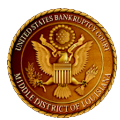You are here
FAQs
-
What must I do before I file a bankruptcy case?
Debtors must complete credit counseling before filing a bankruptcy petition. You must also file with the case, a certificate of credit counseling which is furnished by the provider. Failure to obtain credit counseling before filing your petition may result in dismissal of your case.
A list of credit counseling agencies may be found here (link)
-
Will the bankruptcy stop a foreclosure/sheriff’s sale on my home or car?
Filing a bankruptcy case automatically stops lawsuits, foreclosures, garnishments, and all collection activity against the debtor. The Clerk’s Office will provide you a Notice of Bankruptcy Filing that you may provide to the mortgage company or sheriff’s office.
-
Where can I obtain the required bankruptcy forms?
You can download the necessary bankruptcy filing forms from the Court’s website at the Court Forms menu item. The forms may also be obtained from the Bankruptcy Clerk's office.
-
Which forms are required for filing an emergency bankruptcy case?
A. Voluntary Petition (Official Form 101) (link)
B. List of Creditors
C. List of Creditors Verification (Local Form 1) (link)
D. Statement of Social Security Number (Official Form 121) (link)
E. Declaration Regarding Electronic Filing (Local Form 2) (link)
F. Certificate of Credit Counseling – provided by the credit counseling agency. (link) -
What do you mean by list of creditors?
The list of creditors is a list of the names and current addresses of your creditors and other parties that should receive notice of your bankruptcy. The list is prepared by the debtor and their attorney and must be filed with the bankruptcy case. As a debtor, it is your responsibility to ensure you have listed current, valid addresses for your creditors and government agencies required by the Court.
-
Where do I file a case and what is required to file a case?
Once you have completed the required bankruptcy forms, you must file the documents at the Bankruptcy Court Clerk’s office at 707 Florida Street, Room 119, Baton Rouge, Louisiana 70801. These forms must be filed in person if the debtor is not represented by an attorney. If filing jointly, both debtors must appear in person. The court does not accept mailed or faxed documents. In addition to the required forms, the court requires a valid picture ID for each debtor and the required filing fee (cash, cashier’s check or money order only).
-
Once my case is filed, what happens next?
The Clerk’s Office will notify your creditors of your bankruptcy filing at the addresses provided. A notice of the Meeting of Creditors will be mailed to the debtor with the date, time and location of the meeting. Attendance by the debtor is mandatory.
What is the role of a bankruptcy trustee in a Chapter 7 or 13 case?
In a Chapter 7 case, the case trustee is responsible for the administration of bankruptcy cases and detecting bankruptcy fraud. Creditors are paid by the trustee.
In a Chapter 13 case, the case trustee is also responsible for the administration of bankruptcy cases and detecting bankruptcy fraud. Plan payments made by the debtors are made to the case trustee and creditors are paid through the trustee’s office. -
What is a 341 meeting/meeting of creditors?
The Section 341 Meeting, also called the Meeting of Creditors, is a meeting that a debtor is required to attend after filing for bankruptcy. The meeting is conducted by the trustee. The 341 meetings are held at 707 Florida Street, Room 324, Baton Rouge, Louisiana 70801. The debtor will be asked questions about the information contained in the bankruptcy case. Creditors may also attend this meeting and may question the debtor about his/her financial affairs. If a debtor fails to attend this required meeting, the case trustee may seek to dismiss the bankruptcy case.
The debtor will receive notice by mail of the date and time of the Creditor's Meeting. The debtor is required to bring certain identification information to this meeting: picture identification, copies of recent pay check stubs, and copies of tax returns for the two years prior to filing. Copies will not be returned. -
What if I am unable to attend the 341 meeting on the date/time scheduled?
Please see this page for information on Rescheduling 341(a) Meeting of Creditors (link)
-
When will I receive a discharge of my debts?
Generally, in a Chapter 7 case, a debtor's discharge is entered between 90 to 120 days after the case was filed provided no objections to discharge are filed. The entry of a discharge may take longer if the discharge is objected to by the case trustee or a creditor.
In a Chapter 13 case, a discharge is entered upon the successful completion of the Chapter 13 Plan, usually between 36 to 60 months following the bankruptcy filing.
